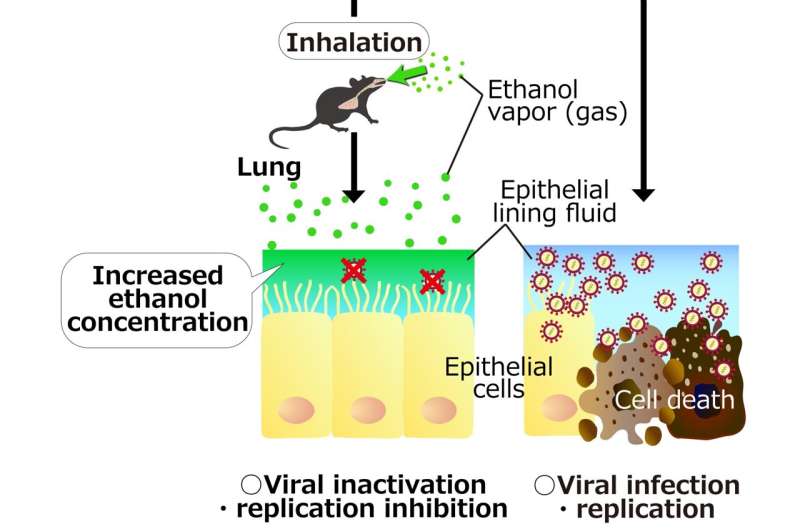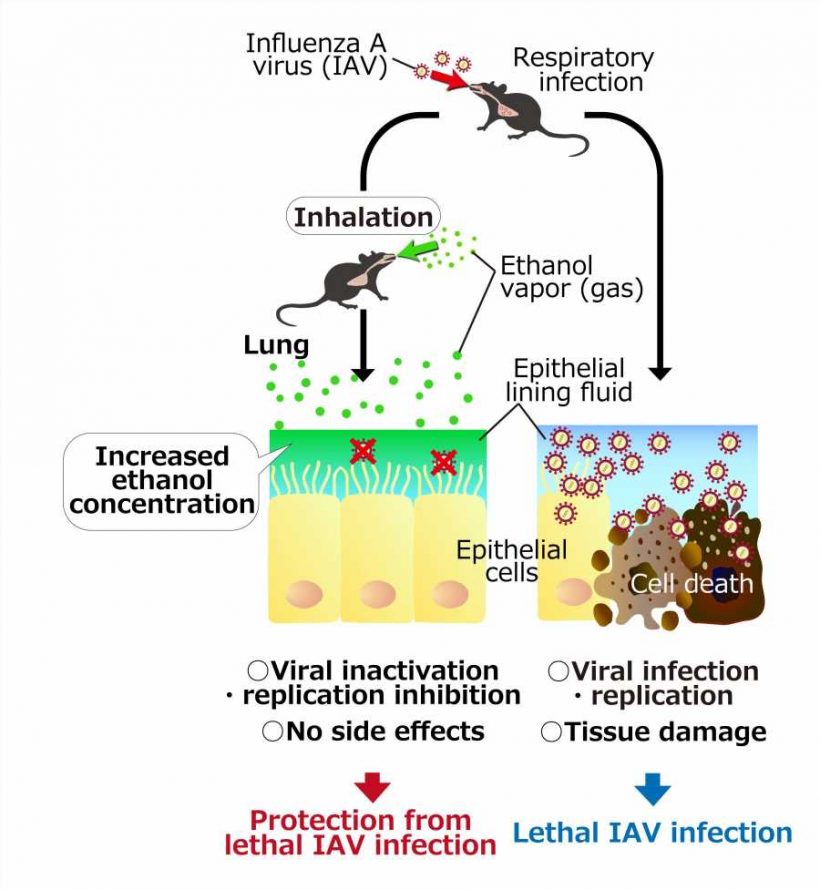
Inhaling low concentrations of ethanol vapor can disable the influenza A virus in mice, without harmful side effects, says a new study by scientists at the Okinawa Institute of Science and Technology (OIST). The scientists believe it may also treat similar viruses such as the one that causes COVID-19.
Prof. Tsumoru Shintake, who leads the Quantum Wave Microscopy Unit at OIST, first proposed the idea to use ethanol vapor to treat respiratory tract infections. He set out to test the approach with his colleague, Prof. Hiroki Ishikawa, leader of the Immune Signal Unit at OIST, and their team members.
“Ethanol is an effective disinfectant for body surfaces, so we wanted to know whether ethanol could also be effective inside the body,” said Dr. Miho Tamai, a scientist in Prof. Ishikawa’s lab.
Using a humidifier to produce ethanol vapor in a small container, they found that when mice infected with influenza A inhale the vapor for ten minutes, the virus is inactivated. The study is published in The Journal of Infectious Diseases.
Influenza A viruses accumulate in a thin fluid layer covering lung cells that protect the surface of the airway. The scientists think that the ethanol vapor must increase ethanol concentrations in the fluid to 20% to successfully treat the infection. This concentration is not toxic to lung cells the scientists created in the lab to mimic human cells. At body temperature, 20% ethanol can not only inactivate the influenza A virus outside of the cells in one minute, but also stop the virus from replicating inside these cells.
The concentration of ethanol provided is important. If the concentration does not reach the right level to inactivate viruses, it will not be useful.
Influenza A is a virus that has an outer membrane, called an envelope. “Ethanol vapor may also inactivate other enveloped viruses such as SARS-CoV-2,” Prof. Ishikawa said, and so far, all viruses that have caused pandemics have been enveloped. “Once the next pandemic happens, maybe we can quickly apply the ethanol vapor inhalation therapy to prevent or cure the disease,” he explained.
Prof. Shintake agreed, noting that the effectiveness of this method does not depend on the variant of the virus. He explained that if designed carefully, an ethanol vapor inhalation method could possibly stop a pandemic in future. He and Prof. Ishikawa will continue to collaborate to optimize the therapy and to investigate its effects on other respiratory infectious diseases such as avian influenza viruses and SARS-CoV-2.
The researchers believe that ethanol vapor inhalation treatment has great potential as a versatile and cost-effective new therapy against various respiratory infectious diseases. But Prof. Ishikawa cautioned that people should not try using ethanol as a therapy on their own. “That may lead to serious side-effects or explosion risks,” he said. “The efficacy and safety of this new treatment on humans and other mammals should be carefully evaluated in the future.”
More information:
Effect of Ethanol Vapor Inhalation Treatment on Lethal Respiratory Viral Infection With Influenza A, The Journal of Infectious Diseases (2023). DOI: 10.1098/jiad089. academic.oup.com/infdis/articl … .1093/infdis/jiad089
Journal information:
Journal of Infectious Diseases
Source: Read Full Article






